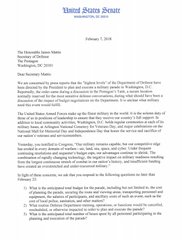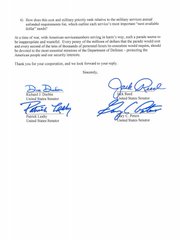The following article by Ishaan Tharoor was posted on the Washington Post website February 8, 2018:
 It’s unclear whether President Trump will get the military parade he so keenly desires. My colleagues first reported Tuesday that the White House is pushing the Pentagon to stage a grand spectacle down Pennsylvania Avenue in the same vein as France’s Bastille Day parade — which Trump not coincidentally attended and admired last year. In the same week we heard the president call his political opponents “treasonous” for not clapping at the State of the Union address, we now contemplate his excitement for the sort of martial display these days more associated with single-party states and irredentist autocrats.
It’s unclear whether President Trump will get the military parade he so keenly desires. My colleagues first reported Tuesday that the White House is pushing the Pentagon to stage a grand spectacle down Pennsylvania Avenue in the same vein as France’s Bastille Day parade — which Trump not coincidentally attended and admired last year. In the same week we heard the president call his political opponents “treasonous” for not clapping at the State of the Union address, we now contemplate his excitement for the sort of martial display these days more associated with single-party states and irredentist autocrats.
Trump, who fondly refers to “my generals” and espouses a decidedly militarist agenda, now thinks it’s his turn. “We’re all aware in this country of the president’s affection and respect for the military,” Defense Secretary Jim Mattis said Wednesday. “We have been putting together some options. We will send them up to the White House for decision.”
The White House described the proposed parade as a joyous occasion to celebrate the nation’s military. But the potential costs and logistical stresses of such an exercise have already raised hackles (Mattis himself warned a congressional committee Tuesday that the military is short of money for necessities such as training and maintenance). So, too, has the sheer gratuitousness of the parade at a time when the United States possesses the largest military footprint on the planet, is still enmeshed in myriad conflicts overseas and already invests in ceaseless celebrations of the troops at virtually every sporting event and holiday.
On Wednesday, Sen. Lindsey O. Graham (R-S.C.) told reporters that a parade aimed at specifically demonstrating American military might was “kind of cheesy and a sign of weakness.” Sen. John Neely Kennedy (R-La.), added that, “America is the most powerful country in all of human history, everybody knows it, and we don’t need to show it off.”
Other critics reckon a grand display is more about gratifying the ego of the commander in chief. “Image is Trump’s moral code,” wrote political commentator Jonathan Chait. “… He conscripts the military as a prop to bathe himself in an aura of presidential grandeur.”
In a piece highlighting the difference between France’s yearly spectacular and Trump’s own ambitions, my colleague Rick Noack argued that Trump’s imagined parade is ultimately about his own brand of showboating nationalism, but that the French ceremonies nowadays commemorate something a bit more inclusive.
“France’s Bastille Day parade, which has persisted through two world wars and a Nazi occupation, has also been used to emphasize a very different message, which could be summarized as: We are only strong together,” Noack wrote. “What Trump may have missed while watching the Paris parade last July was that its organizers have frequently invited foreign troops — from Morocco and India to the United States, Britain and Germany — to march alongside French soldiers or to even lead the procession. Instead of the French flag, French soldiers sometimes wave the European Union flag, even though the political bloc does not have its own army.”
Washington D.C. council member Mary Cheh, (D-Ward 3) says that President Trump is trying to mimic totalitarian regimes with his plans to hold a military parade. (Whitney Shefte/The Washington Post)
Of course, there are few public events as time-honored as the military parade. The tradition of military “triumphs” can be traced to the kingdoms and empires of antiquity, etched on friezes in Mesopotamian palaces and memorialized by Roman chroniclers. It is the primordial act of a state asserting its power and legitimacy, a spectacle to spark pride in the hearts of a leader’s followers and fear in his enemies.
The modern tradition of military parades probably stems from the crack, regimented marching of the 19th century Prussians, whose methods were copied around the world. In 1865, at the close of the American Civil War, the victorious United States staged a two-day Grand Review of the Armies involving some 145,00 troops. National military parades followed victories in the World Wars and even in 1991, after troops came home from Operation Desert Storm. But given the indefinite U.S. commitment to wars in Afghanistan and the Middle East, there’s not much of a groundswell now for a giant march.
Such parades, after all, are more the preserve of nations such as North Korea, Russia and China, whose leaders still need these sometimes surreal displays of military strength to buttress their own rule. In many other parts of the world, military parades are quaint anachronisms, cloaked in remembrance of the past with little relevance for the future. In the United States, the world’s unquestioned military superpower, respect for the military and its members is so ubiquitous that it’s somehow become easy to overlook. An eye-catching parade is hardly necessary to honor the troops.
So what’s the point? “A military parade is really a kind of ritual dance, something like a ballet, expressing a certain philosophy of life,” wrote the great British author George Orwell.
Orwell was writing in 1941, at a time when Britons faced the prospect of defeat and conquest by the Nazis. He decried the fascist “goose-step” as “one of the most horrible sights in the world,” and saw in it “an affirmation of naked power; contained in it, quite consciously and intentionally, is the vision of a boot crashing down on a face. Its ugliness is part of its essence, for what it is saying is ‘Yes, I am ugly, and you daren’t laugh at me’, like the bully who makes faces at his victim.”
This led Orwell to conclude that, “beyond a certain point, military display is only possible in countries where the common people dare not laugh at the army.”
For Trump, the army certainly is no laughing matter — and he has picked a series of political battles with any domestic critics he claims are disrespecting the military. But while most Americans dare not laugh at their army, the reaction to Trump’s parade shows that quite a few are laughing at him.
View the post here.


